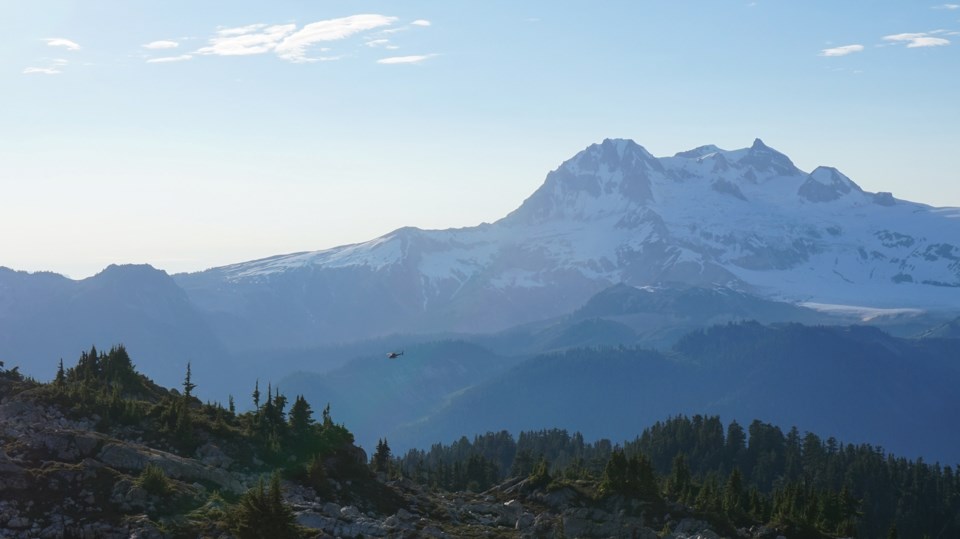The Squamish Nation Chiefs and Council have signed a memorandum of understanding with Whistler Blackcomb Holdings over the proposed expansion plans at the resort.
Whistler Blackcomb Holdings announced last week a planned investment of more than $345 million in new indoor and outdoor features in Whistler. The improvements, coined Whistler Blackcomb Renaissance in a company news release, will to be completed in three phases and include an indoor water park on Blackcomb Mountain, a mountain coaster and new bike trails at the Whistler Mountain Bike Park.
“We have been working towards creating a mechanism so the Nations would have all parties at the table to discuss the impacts to the rights and title, cultural concerns and environmental concerns that the Nation has,” Chief Ian Campbell told The Squamish Chief. “So what we have done is struck an non-binding MOU [memorandum of understanding] with Whistler Blackcomb as they go forward sharing their vision of the next 60 years to the public… The key messaging was for Whistler Blackcomb to recognize the Squamish and the Lil’wat Nations and the need for the proponent to then meet with us to subsequently discuss any of the concerns and involvement that the Nation will potentially have.”
Campbell stressed the Squamish Nation would not approve any expansion until its interests as well as cultural and environmental concerns were addressed by Whistler Blackcomb Holdings, the Resort Municipality of Whistler and the province.
“It looks very exciting, but again the two nations have expressed a very strong desire that we are involved in any of the decision making, government to government, along with any economic opportunities,” Campbell said.
Negotiations between Whistler Blackcomb Holdings and the Squamish and Lil’wat Nations over a proposed business partnership are planned and are one of the conditions of the Renaissance expansion, according to the company’s news release.
“We continue to be in active discussions with the province and the Squamish and Lil’wat First Nations to secure the renewal of our Whistler Blackcomb’s Master Development Agreements and master plans to pave the way for Renaissance,” Dave Brownlie, the Whistler Blackcomb president and CEO, said in the release.
“Whistler is in the Squamish and Lil’wat First Nations traditional territories, and we want to partner with these important stakeholders to benefit our shareholders and our communities.”
Brownlie said the expansion will increase year-round visitation to Whistler.
In June of 2015, Brownlie told The Squamish Chief he had reservations about the proposed Garibaldi at Squamish resort proposed for Squamish for a myriad of reasons, including increased visitor traffic to the corridor on Highway 99.
“They are talking about two million visits year-round. That is impossible,” he said at the time. “We are talking about the development of a community, a resort the size or slightly bigger than Squamish is today.”
For his part, Jim Chu, a vice-president with the Aquilini Group, the proponents of Garibaldi at Squamish, was short on words but generous in his reaction.
“Whistler’s ideas sound good,” he said. “These new [Whistler] facilities don’t change our plans.”
‘Withhold approval’
A local group that is made up of members of various corridor mountain recreation groups is cautious about the Renaissance expansion plans.
“Garibaldi Park 2020 provisionally supports the current Whistler Backcomb Renaissance Project provided that the resort lives up to its outstanding legal and moral obligations to restore public vehicle access, as it once was, to the historic Singing Pass Trailhead at the Garibaldi Park boundary,” said Chris Ludwig of the Garibaldi Park 2020 advocacy group.
The group wants to create a new Garibaldi Park Master Plan by the year 2020 and says for the past 16 years, even though Whistler Blackcomb had agreed, they have not granted public access to the Singing Pass Trail.
“We believe the [provincial government] Mountain Resorts Branch should withhold approval to the Whistler Blackcomb Renaissance Project until the Singing Pass Trail public access fiasco is resolved,” Ludwig said.
Doug Forseth, vice-president of planning, government relations and special projects for Whistler Blackcomb, said the company has been working for about two years with different stakeholders on improving access to the trail.
“For clarity, we don’t have a legal obligation for public vehicle access,” Forseth told The Squamish Chief Monday, adding the company’s obligation in the 1982 Whistler Master Development Agreement is to allow free public access by foot on hiking trails between May and November each year.
The company will not be providing road access for safety and financial reasons but is working on improving the hiking trail access, Forseth said.
Another meeting about Singing Pass is scheduled for the end of April, Forseth said.
Much work remains to be done before visitors will be riding the mountain coaster or splashing in the waterpark at Whistler as part of the Renaissance expansion, according to Whistler Blackcomb Holdings. The planned expansion will need finalization of agreements with the Squamish and Lil’wat Nations, as well as municipal and provincial approvals, among others.



